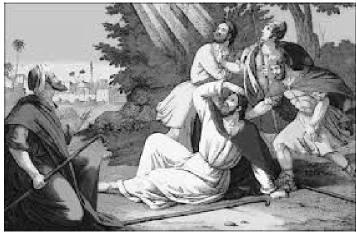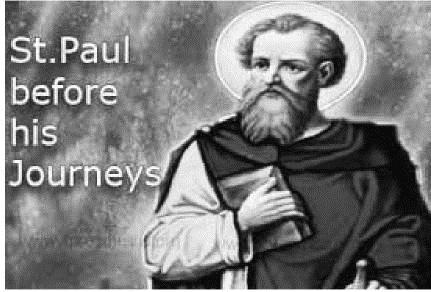|
25th January: St Paul: the first Christian Intellectual
as published in Great Yarmouth Parish Life
Parish Pump
 This month, on 25th January, the Church celebrates probably the most famous conversion of all. At least, what happened to a young man called Saul on the road to Damascus has become a byword for all instant conversions – what is known as a ‘damascene’ moment. Saul was a devout Jew, a Pharisee, a student of Gamaliel and a fierce critic of the followers of Jesus, then a very new sect on the religious scene This month, on 25th January, the Church celebrates probably the most famous conversion of all. At least, what happened to a young man called Saul on the road to Damascus has become a byword for all instant conversions – what is known as a ‘damascene’ moment. Saul was a devout Jew, a Pharisee, a student of Gamaliel and a fierce critic of the followers of Jesus, then a very new sect on the religious scene
On his way to Damascus to organize a purge of Christians in that city, he was blinded by a bright light and heard a voice saying, “Saul, Saul, why are you persecuting me?” He asked the identity of the voice, and it replied, “Jesus, whom you are persecuting”. Stunned by the experience, he followed further instructions which led him to a Christian man in Damascus, who prayed with him. As he did, Saul’s sight was restored
The experience convinced him that Jesus – crucified in Jerusalem four or five years earlier – was in fact the Messiah and had risen from the dead. After a period of instruction, Saul was baptized and took the name by which history has recognised him, Paul. At first, some Christians were wary about the reality of his conversion, but over a period of time he was accepted and indeed eventually recognised as an ’apostle’, a ‘special messenger’ of Jesus Christ
His intellectual stature and leadership gifts quickly marked him out, and within a few years he became a leading figure in the emerging Christian Church, preaching and founding churches all over the Middle East, largely of Gentile converts. He was eventually martyred in Rome, probably in 65AD
 Paul was the first intellectual of the Christian Church, the man who was able to set the events of the life and teaching of Jesus, and especially his death and resurrection, into a coherent theology, with its roots very clearly in the Jewish faith of his own upbringing. He’s not always easy to follow. Even the New Testament admits that: ‘there are some things (in his letters) hard to understand’ (2 Peter 3:16). But at the same time he gave the new faith a foundation and credibility which have stood it well down the centuries Paul was the first intellectual of the Christian Church, the man who was able to set the events of the life and teaching of Jesus, and especially his death and resurrection, into a coherent theology, with its roots very clearly in the Jewish faith of his own upbringing. He’s not always easy to follow. Even the New Testament admits that: ‘there are some things (in his letters) hard to understand’ (2 Peter 3:16). But at the same time he gave the new faith a foundation and credibility which have stood it well down the centuries
Many people think of Paul as a rather negative, narrow misogynist, but even a quick reading of his letters actually reveals a person of great warmth, who evoked enormous affection and devotion from others. ‘You would have plucked out your eyes and given them to me!’ he writes to the Christians at Galatia. He was, of course, a man of his time and culture, in days when women were disregarded in terms of status and leadership
But read his letters, and see how large a role women play in them and how much scope he gave them to lead and teach in the Church. In terms of the first century, St Paul was a dangerous liberal! So all in all, the amazing Paul of Tarsus deserves a bit of celebrating on 25th January
|
|
|
|